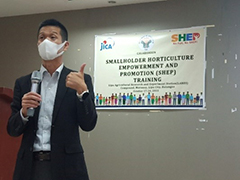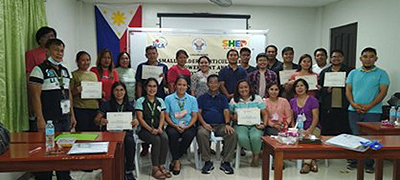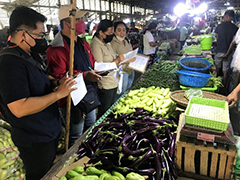JICA introduces market-oriented agri approach from Kenya to the Philippines
2022.11.04
As a move to boost income of Filipino farmers, the Japan International Cooperation Agency (JICA) holds capacity development activities on a market-oriented farming approach in the Philippines.
For more than a decade, JICA trained farmers in Kenya on a market-oriented approach in agriculture. Called Smallholder Horticulture Empowerment and Promotion (SHEP) Approach, the project has doubled the income of Kenyan farmers within two years of implementation since its pilot in 2006.
The project has been quite a success that SHEP is now being implemented in 28 countries in the African region, benefitting 225,000 small scale farmers. Through training courses, SHEP is being introduced to other JICA partner countries outside Africa like the Philippines.
SHEP is a hybrid concept of economy and psychology to motivate farmers in shifting from a ‘grow and sell' mindset to ‘grow to sell.' When farmers think of farming as a business, they can make cultivation plans that address what the market needs.
"JICA is aiming to help Filipino farmers rise from current economic challenges. When farmers are capacitated with innovative approaches and skills, they'll have better means to improve their lives," said JICA Senior Representative SHIMIZU Mikako.

Dr. Jiro Aikawa, JICA Senior Advisor for Agriculture and Rural Development, during his lecture on the Introduction of SHEP
In 2020 and 2021, JICA through its Knowledge Co-Creation Program (KCCP) shared the SHEP approach with personnel from the Agribusiness and Marketing Assistance Division of the Department of Agriculture - Region IVA. The ex-SHEP participants, in turn, spearheaded a SHEP seminar targeting extension workers from provincial and municipal local government units in Batangas.
JICA Senior Advisor for Agriculture and Rural Development Dr. Jiro Aikawa led the lecture on the introduction of SHEP in said seminar. Dr. Aikawa is an expert in SHEP approach and has been involved in the technical cooperation project in Kenya when SHEP was developed.
"We think that the SHEP approach has a huge potential in the Philippines. Although most of the activities in SHEP are already being taught to our farmers and/or implemented, still, our farmers are into "grow and sell" not "grow to sell". By adopting SHEP approach, which empower and motivate farmers to be self-reliant and pursue market-oriented agriculture, we are optimistic that Filipino farmers will have a more profitable and sustainable agribusiness" said one of the ex-SHEP trainees, Mr. Richmond Pablo.
Through SHEP, farmers and market players are able to build good relationship by sharing information with each other. Using the approach, farmers become motivated to be competent (e.g. they are able to do market surveys), and autonomous (e.g. they choose their own crops).
JICA promotes market-oriented agricultural practices through an ongoing Technical Cooperation Project (TCP) with the DA entitled "Project for Market-Driven Enhancement of Vegetable Value Chain in the Philippines". The project aims to develop and promote inclusive food value chain models to strengthen vegetable value chains in Benguet and Quezon as pilot project sites. The concept of SHEP approach will be utilized in the implementation of the said TCP and as such, three (3) Filipino counterparts have already been trained in SHEP Approach to date.

Regional Executive Director Milo Delos Reyes of DA Region IVA (middle, front row) with the participants and facilitators of the SHEP training during the closing ceremony. Photo by DA.

SHEP training participants conducting
market survey in Lipa, Batangas
scroll